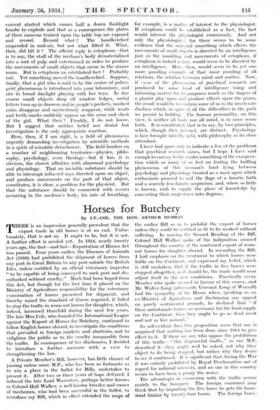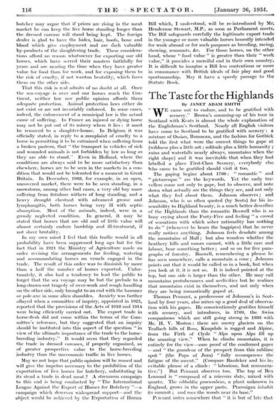Horses for Butchery
By LT.-COL. THE HON. ARTHUR MURRAY
THERE is an impression generally prevalent that the export trade in old horses is at an end. Unfor- tunately, that is not so. It ought to be, but it is not: A further effort is needed yet. In 1914, nearly twenty years ago, the first—and last—Exportation of Horses Act was passed. Four years earlier, the Diseases of Animals Act 0910) -bad prohibited the shipment of horses from any port in Great Britain to any port outside the British Isles, unless certified by an official veterinary inspector " to be capable of being conveyed to such port and dis7 embarked without cruelty." Much had been hoped from this Act, but though for the first time it placed on the Ministry of Agriculture responsibility for the veterinary examination of horses presented for shipment:, and thereby raised the standard of fitness required, it failed to stop the traffic in worn-out horses for slaughter, which, indeed, increased threefold during the next few years. The late Miss Cole, who founded the International League against the Export of Horses for Butchery, continued to follow English horses abroad, to investigate the conditions that prevailed in foreign markets and abattoirs, and to enlighten the public as to the cruelty inseparable from the traffic. In consequence of her disclosures, I decided to introduce a further measure with a view to strengthening the law. .
. A Private Member's Bill, however, has little chance of passing unless some M.P., who has been so fortunate as to win a place in the ballot for Bills, undertakes to present it. After two or three years of -hope deferred, I induced the late Lord Wavertree, perhaps better known as Colonel-Hall Walker,- a well-known breeder and- owner of racehorses, who had been successful in the ballot, to introduce my Bill, which in effect extended the scope of the earlier Bill so as to prohibit the export of horses unless they could be certified as fit to be worked without suffering. In moving the Second Reading of the Bill; Colonel Hall Walker spoke of the indignation aroused throughout the country at the continued export of worn- out horses for slaughter abroad. In seconding the Bill, I laid emphasis on the treatment to which horses were liable on the Continent, and expressed my belief, which is still unshaken, that if the traffic in live horses were stopped altogether, as it should be, the trade would soon adjust itself to the new conditions. Practically every Member who spoke seemed in favour of this course, and Mr. Walter Long (afterwards Viscount Long of Wraxall) had the sympathy of the House when, speaking as an ex-Minister of Agriculture and disclaiming any appeal on purely sentimental grounds, he declared that " if these unfortunate horses are necessary for the food supply on the Continent, then they ought to go as dead meat and not as live animals."
So self-evident does this proposition seem that one is surprised that nothing has been done since 1914 to give effect to it. If there arc any who oppose the prohibition of this traffic—" this disgraceful traffic," as one M.P. described it—they might well be asked, not why they object to its being stopped, but rather why they desire to see it continued. It is significant that during the War it was entirely prohibited by Royal Proclamation out of regard for national interests, and no one in this country seems-to-have been a penny -the worse.
The advantages in connexion with the traffic accrue Mainly to the foreigner. The foreign consumer may think that by importing the live horse he gets his horse- meat- fresher by twenty-four hours. The foreign horse butcher may argue that if prices are rising in the meat market he can keep the live horse standing longer than the dressed carcase will stand being kept. The foreign dealer is glad to have the hides, hair, hoofs, bone and blood which giVe employment and are such valuable by-products of the slaughtering trade. These considera- tions afford no reason whatsoever. for exporting our old horses, which have served their masters faithfully for years and are nearing the time• when they have greater value for food than for work, and for exposing them to the risk of cruelty, if not wanton brutality, which faces them on the other side.
That this risk is real admits of no doubt at all. Once the sea-voyage is over and our horses reach the Con- tinent, neither law nor public opinion affords them adequate protection. Animal protection laws either do not exist or arc not invariably enforced. In some cases, indeed, the enforcement of a- municipal-law is the actual -cause of suffering. In France an injured or dying horse may not be put out of its misery where it lies : it must be removed to a slaughter-house. In Belgium it was officially stated, in reply to a;pomplaint of cruelty to a horse in permitting it to be entrained when suffering from a broken pastern, that " the transport in vehicles of sick and wounded animals is not forbidden by law as long as they are able to stand." Even in Holland, where the conditions are always said to be more satisfactory than elsewhere, horses arc to be seen in the markets in a con- dition that would not be tolerated for a moment in Great Britain. In December, 1933, for example, in an open, uncovered market, there were to be seen standing, in a snowstorm, among other bad cases, a very old- bay mare suffering from fistulous withers of long standing, and a heavy draught chestnut with advanced grease and lymphangitis, both horses being very ill with septic. absorption. Most of the animals, indeed, were in a grossly neglected condition. In general, it may be stated that horses that are old and of little value will almost certainly endure hardship and ill-treatment, if not sheer brutality.
In my own mind I feel that this traffic would in all probability have been suppressed long ago but for the fact that in 1921 the Ministry of Agriculture made an order revising the arrangements for feeding, watering and accommodating horses on vessels engaged in the trade. The result of this order -was to diminish by more than a half the number of horses exported. 'Craw., tunately, it also had a tendency to lead the public to forget that the sea voyage may be but the prelude to a long-drawn-out tragedy of over-work and rough handling on the other side, only brought to an end with the hammer or pole-axe in some alien shambles. Anxiety was further allayed when a committee of inquiry, appointed in 1925, reported that the provisions of the Acts .of 1910 and 1914 were being efficiently carried out. The export trade in horse-flesh did not come within the terms of the Com7 mittee's reference, but they suggested that an inquiry should be instituted into this aspect of the question " in view of the ultimate importance of the trade to the horse- breeding industry." It would seem that they regarded the trade in dressed carcases, if properly organized, as of greater prOspective value to the horse-breeding industry than the uneconomic traffic in live horses.
May we not hope that public opinion will be roused and will give the impetus necessary to the prohibition of the exportation of live horses for butchery, substituting in its stead a trade in dead meat ? A strenuous campaign to this end is being conducted by " The International League Against the Export of Horses for Butchery "—a campaign which deserves widespread support—and the object would be achieved by the Exportation of Horses Bill Which; I understand; will be re-introdUced -by Mr'4 -Henderson -Stewart, M.P.; as soon as Parliament Mee- ti4 The Bill safeguards carefully the legitimate -export • trade in the younger or more valuable horses honestly intended for work abroad or for such purposes as breeding, racing, showing, remounts, &c. • For those horses, on the other hand, whose " food value " is greater than their " work value," it provides a merciful end in their own country; It is difficult to imagine a Bill less contentious or more in consonance with British- ideals - of . fair play and good sportsmanship. May it have a speedy passage- to- the Statute Book.











































 Previous page
Previous page